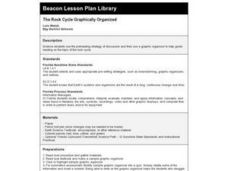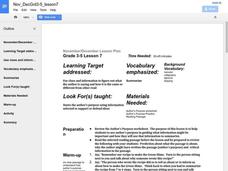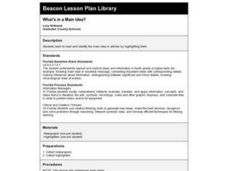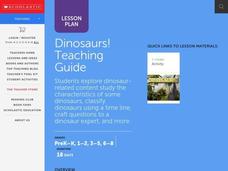Curated OER
The Rock Cycle Graphically Organized
Fourth graders use the prereading strategy of discussion and then use a graphic organizer to help guide reading on the topic of the rock cycle. They use a worksheet imbedded in this plan to guide thier inquiry.
Curated OER
New England Colonies
Students study the New England colonies. For this colonies lesson, students use a directed reading-thinking method to learn about the New England colonies. Students follow the method to make predictions, read the text, and analyze the...
Curated OER
Turbojet Thrust
Students, after reading the Web page Turbojet Thrust and completing the activity, explain how jet engines use air to produce thrust. The educational software ""FoilSim" is used in this lesson to help students calculate thrust.
Curated OER
Writing Prompts: Prose, Pamphlets and Poems
Students practice reading an atlas and writing prompts. They use graphic organizers to construct their writing prompt. They use the Internet to do their research.
Curated OER
Farm Products Help Me Grow
Students view a display of empty food containers (or illustrations). They select a food and decide as a class if it has an animal or plant origin. Students view a display of common farm animals that are commonly eaten (cow, pig, chicken,...
Curated OER
Author's Purpose
Fifth graders determine the meaning of author's purpose. In this author's purpose lesson, 5th graders apply the PIE (persuade, inform, entertain) strategy to determine why an author wrote a piece of writing. They examine passages and...
Curated OER
Missing May
Students listen to the first couple chapters in the book, Missing May by Cynthia Rylant and then sketch or write about a character or the setting, using words and phrases from the book as guides. They then discuss the chapters using the...
Curated OER
Borrowed Inspiration: Writing Social Commentary
Students read poems with social themes. In this poetry analysis lesson, students read poems selected by their instructors and complete the provided social commentary chart to determine how the poems speak out against social ills....
Curated OER
Building a Sentence
First graders echo a sentence targeting a vowel selected by the teacher and shown on a sentence strip. In this sentence building lesson, 1st graders put the cut up sentence strip back into correct order, repeating the sentence. Students...
Curated OER
A Recipe For Success
Sixth graders explore a relevant application of ratios and proportions. They apply this concept through guided practice and interactive feedback.
Curated OER
What's in a Main Idea?
Second graders read newspaper articles. In this language arts instructional activity, 2nd graders identify the main ideas found in the articles by highlighting them. The entire class selects one interesting article from the sports...
Curated OER
Dinosaurs
Students will develop goals for inquiry. They will also improve content area reading and research skills. The context of studying dinosaurs will help learners to distinguish from organisms that live presently and those from the past...
Curated OER
Our Successful Traits
Learners investigate the traits necessary for classroom success. They brainstorm in order to find different traits while creating lists. Then students work in groups to create simple definitions for selected character traits of success...
Curated OER
Homophones: Elementary Word List
In this language arts worksheet, students select the correct word to complete each of 9 sentences. Students read each sentence and from two choices, select the appropriate homonym to complete the sentence.
Curated OER
Winter Lights: A Season In Poems & Quilts
Students read the book Winter Lights: A Season in Poems & Quilts and do language arts and math activities that go with the book. In this language arts and math lesson plan, students read the book given and do activities that include...
Curated OER
The Holocaust: Deadly Medicine
Students tour a web exhibit of the Holocaust Museum and discuss eugenics. In this Holocaust lesson plan, students tour an exhibit called "Deadly Medicine, Creating the Master Race," guided by the teacher. Students explore the Biblical...
Curated OER
NATO in Afghanistan – European and Canadian Positions
Learners take a closer look at Canada's committment to NATO in Afghanistan. In this global issues activity, students read a handout about NATO's involvement the Afghanistan conflict. Learners respond to discussion questions and conduct...
Curated OER
Borrowed Poem Performance: Practice for Slam
Learners practice for a poetry slam. In this poetry lesson, students select borrowed poems to perform in a poetry slam in order to participate in their own poetry slam competition.
Curated OER
Cruising Aircraft and Balanced Forces
Pupils, after reading an explanation from a NASA Web-based textbook, demonstrate an understanding of the text by applying it to questions involving cruising aircraft and balanced forces.
Curated OER
Nautical Navigation
Middle schoolers work together to discover the importance of charts while navigating. They complete a worksheet and practice reading maps. They create their own nautical chart to complete the lesson.
Curated OER
Taking a Stand with Rosa Parks
Students discuss African-American history from slavery to the civil rights movement. They discuss individual people who shpaed history by reading their biographies and researching the age in which they lived. Studnets comprehend the...
Curated OER
We Are a Comm-un-it-y. I've Got All My Classmates with Me-Part I
Students investigate the meaning of community. In this community lesson, students look at the concepts of civic engagement, civic responsibility, and common good. They determine how a classroom is a community and the need for having...
Curated OER
How Logical is Garfield?
Third graders analyze comics found in the newspaper for samples of logical, emotional, and ethical appeal. They write a paragraph for each selected comic strip explaining how the comic strip represents the use of logic, emotions, or ethics.
Curated OER
The World's Ten Greatest Inventions
Students review a list of important inventions from the last century and a half. They order the top ten inventions with an explanation accompanying their choices and then write a report on a selected invention.

























